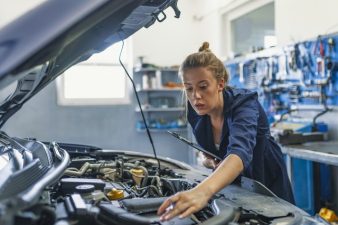Auto Repair Fundamentals That Can Benefit Everyone
Auto Mobile /
You can feel an instant jolt and a loss of power when you’re stripped of your automobile. After all, it’s how you get to work and everywhere else you want to go. What are you going to do? You shouldn’t worry, and instead you should use the following information to help you along the way when making decisions regarding auto repairs.
Do not take your car to the first mechanic you find. You need to do some research to find a reliable mechanic with fair prices. Ask your friends and family about the mechanics they have been to in the past and check the Internet to find reviews written by other customers.
Checking and repairing the air conditioning in your car is quite complex. If you need to have it checked or fixed, find a mechanic with an air conditioning certification. The gas used for air conditioning is potentially dangerous and this system is a lot more complex than the other parts in your vehicle.
If you’re performing your own repairs underneath a car and have it raised in the air, ensure that the lifting device you use is secure. Never lift a car that is not on level ground or on a firm surface. Always use jackstands in the proper position and never solely rely on a jack to keep a car raised off the ground.
Before you actually take your car to a mechanic, try to assess what the problem is first. Being able to diagnose the problem, even if you can’t fix it, can help you from being fleeced by an unscrupulous mechanic. Mechanics sometimes will cost you an arm and a leg for unnecessary repairs.
Take off all of your keychain charms; just use your key. The ignition cannot hold the weight of a big key chain. Particularly, if you notice that the key is hard to extract from the ignition, you need to make a change!
A dent or scratch in a plastic bumper is very easy to fix. Start by cutting the bits that stick out from the dent until the edges are smooth. You can then use a filler to make the dent disappear. Sand over the area and paint to hide the repair.
Unless it is required by your car’s warranty, don’t feel obligated to use the repair shop at the dealership. There are many reputable independent auto repair shops and they are often cheaper. Ask your friends and family members for a recommendation if you are unsure which shops in your area are trustworthy.
You need to keep track of all the repairs and transactions with your garage or dealership. If you decide to file a complaint, you will need to document what happened. Keeping these documents will also help you inform buyers about the repairs you did on the vehicle if you want to sell your car.
How do you feel about the tips and advice that you’ve learned? You should be able to make better decisions now when problems arise with your vehicle, and you shouldn’t be thinking it’s the end of the world. You can get a fair price, and you can stay well-informed.
Education & Science
Home, Business, General
Fashion & Shopping
Law
Home, Business, General
Fashion & Shopping
Home, Business, General
Home, Business, General
Health
Education & Science
Computer & Technology
Business
Home, Business, General
Health
Home, Business, General
Family
Travel & Food
Home, Business, General
Home, Business, General
Law
Home, Business, General
Home, Business, General
Automotive
Home, Business, General
Computer & Technology
Health
Home, Business, General
Home, Business, General
Insurance
Business
Automotive
Home, Business, General
Fashion & Shopping
Home, Business, General
Home, Business, General
Health
Computer & Technology
Home, Business, General
Travel & Food
Home, Business, General
Home, Business, General
Travel & Food
Travel & Food
Health
Home, Business, General
Health
Law
Law
Home, Business, General
Home, Business, General
Health
Home, Business, General
Computer & Technology
Law
Business
Law
Home, Business, General
Sport
Fashion & Shopping
Health
Home, Business, General
Fashion & Shopping
Home, Business, General
Home, Business, General
Law
Home, Business, General
Home, Business, General
Home, Business, General
Home, Business, General
Health
Law
Sport
Home, Business, General
Fashion & Shopping
Home, Business, General
Education & Science
Health
Sport
Computer & Technology
Health
Health
Home, Business, General
Home, Business, General
Home, Business, General
Business
Fashion & Shopping
Home, Business, General
Computer & Technology
Home, Business, General
Sport
Travel & Food
Home, Business, General
Home, Business, General
Home, Business, General
Home, Business, General
Home, Business, General
Health
Home, Business, General
Home, Business, General
Home, Business, General
Home, Business, General
Home, Business, General
Computer & Technology
Home, Business, General
Fashion & Shopping
Home, Business, General
Home, Business, General
Fashion & Shopping
Computer & Technology
Travel & Food
Health
Computer & Technology
Computer & Technology
Business
Travel & …







